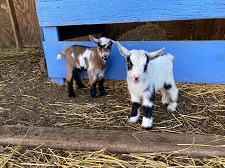Keeping Guests Safe From Zoonotic Diseases
Agritourism can be a great way for farmers to add additional sources of income to their operations. Broadly defined, agritourism involves activities that bring visitors to the farm and can involve outdoor recreation, educational experiences, entertainment and direct sale of goods. Put another way, agritourism is where agriculture and tourism meet.
While agritourism offers many benefits, it also creates issues related to health and safety that farmers need to be aware of. One of these risks is zoonotic diseases.
What are zoonotic diseases?
Zoonotic diseases are infectious diseases that can be transmitted between animals and people. Some examples of zoonotic diseases include Campylobacter, Salmonella, E. coli, Yersinia enterocolitica and Cryptosporidium.
The common symptoms of zoonotic diseases are diarrhea and abdominal pain. Other symptoms may include vomiting, fever, cramps and bloody diarrhea. People with mild symptoms usually recover without treatment. However, it should be noted that these illnesses can lead to hospitalizations, and severe complications also can occur.
People get sick from zoonotic diseases by swallowing the germs that cause them. In agritourism settings, guests may end up with germs on their hands after touching an animal at a petting zoo or interacting with an animal during a different activity.
Steps to Protect Visitors
There are a number of steps farms can take to protect visitors from zoonotic diseases during their time at the ranch or farm. These steps include:
- Provide fully stocked hand-washing stations with running water and soap for guests to use after interacting with animals. Keep in mind that these stations should be accessible to children, persons with disabilities and elderly guests.
- Insist that guests keep food, drinks, baby bottles, pacifiers, toys and strollers out of animal areas.
- Remind guests to refrain from touching their face, and remind parents to supervise their children. Young children tend to be more likely to get sick because they are more likely to put their hands in their mouth.
- Refrain from transporting manure or soiled animal bedding through public areas of your facility, even when guests are not present.
- Remove any animals that are showing signs of illness from exhibits.
- Post signage reminding guests that animals carry germs.
- Do not allow visitors into animal pens. Consider only allowing petting of animals over or through barriers in designated areas.
Remember, we are here to help. Contact Paul Hall & Associates Insurance for more risk management strategies.
